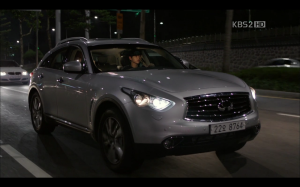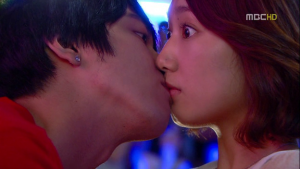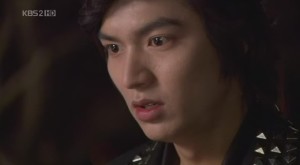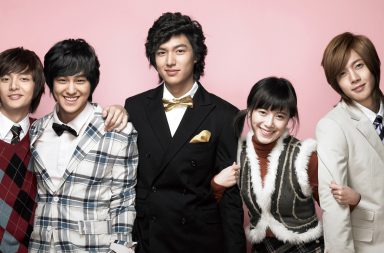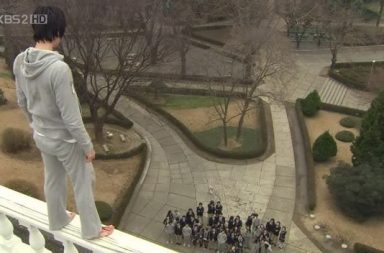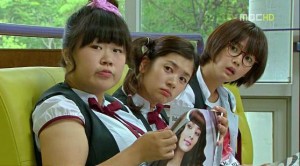 We open with a shot of our poor, stupid and/or clumsy heroine. She wears little to no makeup, has zero fashion sense and is thus deemed ugly. She falls in love with a cold, arrogant guy who is more than likely rich, who also treats her like the scum beneath his shoes. Sound familiar? Does it make you think of maybe Boys over Flowers or Playful Kiss? Perhaps you’re not a teen romance watcher.
We open with a shot of our poor, stupid and/or clumsy heroine. She wears little to no makeup, has zero fashion sense and is thus deemed ugly. She falls in love with a cold, arrogant guy who is more than likely rich, who also treats her like the scum beneath his shoes. Sound familiar? Does it make you think of maybe Boys over Flowers or Playful Kiss? Perhaps you’re not a teen romance watcher.
Try this sequence on for size then. Our oh-so-attractive male lead is driving — no, speeding — through the city at night, and he is visibly upset. Something just happened with his love interest, something bad. Without a thought given to other motorists on the road, he decides to make a U-turn in the middle of the second largest city in the world. No biggie. If you’ve watched any Korean drama, you have seen these or countless other overused tropes and plotlines that we’ve discussed in the past.
Barely a step below soap operas, dramas have one goal: pull at the heartstrings, whether it is through angry crying or almost nauseating fluff. And yet, they continue to use the same cliches over and over again, so much so that it sometimes seem like they are more suds and bubbles than soap. So how do they succeed?
It’s true that people who watch dramas are not exactly expecting award-winning acting or screenwriting, but there are only so many times I want to see the girlfriend refuse to leave her boyfriend despite his mother’s generous monetary bribe or the wide-eyed heroine caught off-guard by her love interest suddenly kissing her before it’s too much. As ridiculous and over-the-top as some dramas can be, I keep coming back to them because of their brevity.
Watching any other type of show — be it Korean, American, British, Spanish or anything else — I am always cautious before starting because there is just so much to them. I have to learn characters and their pasts and watch marathons of seasons. It requires a lot of time whereas dramas are only sixteen to twenty episodes on average, with no hiatuses or breaks. Even dramas that reach thirty and fifty episodes are only one season — a long season but a single one nonetheless.
With an allotted amount of time to do everything that a drama is supposed to do, writers often turn to the same grabbag of plot devices to make things easier for themselves and audiences. Characters are often victims of this resort, and many writers choose to give us, say, the stereotypical soulless, often short-haired villainess whom we instinctively hate, instead of a different, more complex antagonist that we may not fully understand because he or she is too difficult to develop in so few episodes.
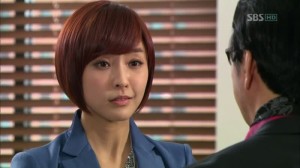
And it’s hard to come up with something new, even without the time limit. One of my writing professors always says, “Every story has been told before. Shakespeare and the Greeks covered it all.” How many books are there about the angsty boy growing up to find his love? How many movies are there about the divorced couple getting back together? The same idea can be applied to dramas except drama writers have to work double time. They not only have to create a story that is engaging and somehow a little bit different from every other show but also work with time constraints, which is a feat itself and something to respect.
But there is a limit to how much I can tolerate before it becomes annoying and just lazy. I don’t know how many shows have gone that route and thus disappointed me. Take Boys over Flowers. (Warning: Spoilers ahead. But who hasn’t seen Boys over Flowers?) The show was incredibly melodramatic, but Kim Hyun-joong’s beautiful face and Lee Min-ho’s acting were enough to keep me hooked. When we finally reached the end after so much emotional torture, the writers had to give me one last stab by throwing in the amnesia twist (to be fair, they didn’t have to follow the Taiwanese interpretation so closely, right?), and I just had to check out of the show by then. It seemed contrived and pointless because it did nothing for movement of the plot and felt more like filler than anything else.
Dramas are great because they let us experience an emotional roller coaster for a short period of time, no investment required. But they also seem to follow a distinct pattern with the same set of stereotypes and plot devices. It’s hard to say when a drama has become so replete with them that it becomes too much. There’s a limit somewhere, but it’s hard to pinpoint.
Readers, where do you draw the line?
(MBC, KBS, SBS)
